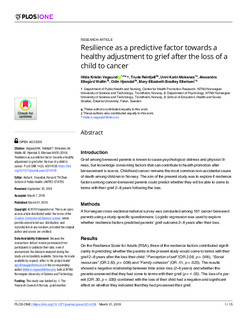| dc.contributor.author | Vegsund, Hilde Kristin | |
| dc.contributor.author | Reinfjell, Trude | |
| dc.contributor.author | Moksnes, Unni Karin | |
| dc.contributor.author | Wallin, A. E. | |
| dc.contributor.author | Hjemdal, Odin | |
| dc.contributor.author | Eilertsen, Mary-Elizabeth B | |
| dc.date.accessioned | 2019-10-03T13:49:23Z | |
| dc.date.available | 2019-10-03T13:49:23Z | |
| dc.date.created | 2019-05-20T14:01:43Z | |
| dc.date.issued | 2019 | |
| dc.identifier.issn | 1932-6203 | |
| dc.identifier.uri | http://hdl.handle.net/11250/2620140 | |
| dc.description.abstract | Introduction
Grief among bereaved parents is known to cause psychological distress and physical illness, but knowledge concerning factors that can contribute to health promotion after bereavement is scarce. Childhood cancer remains the most common non-accidental cause of death among children in Norway. The aim of the present study was to explore if resilience factors among cancer-bereaved parents could predict whether they will be able to come to terms with their grief 2–8 years following the loss.
Methods
A Norwegian cross-sectional national survey was conducted among 161 cancer-bereaved parents using a study-specific questionnaire. Logistic regression was used to explore whether resilience factors predicted parents’ grief outcome 2–8 years after their loss.
Results
On the Resilience Scale for Adults (RSA), three of the resilience factors contributed significantly in predicting whether the parents in the present study would come to terms with their grief 2–8 years after the loss their child: “Perception of self “(OR 2.08, p = .048), “Social resources” (OR 2.83, p = .008) and “Family cohesion” (OR .41, p = .025). The results showed a negative relationship between time since loss (2–6 years) and whether the parents answered that they had come to terms with their grief (p = < .05). The loss of a parent (OR .30, p = .030) combined with the loss of their child had a negative and significant effect on whether they indicated that they had processed their grief.
Conclusion
The total score of RSA and three of the six resilient factors contributed significantly in predicting whether cancer-bereaved parents in the present study indicated that they had come to terms with their grief to a great extent. The present study supports hypotheses that regard resilience as an important contribution in predicting healthy outcomes in people exposed to adverse life events. | nb_NO |
| dc.language.iso | eng | nb_NO |
| dc.publisher | Public Library of Science | nb_NO |
| dc.rights | Navngivelse 4.0 Internasjonal | * |
| dc.rights.uri | http://creativecommons.org/licenses/by/4.0/deed.no | * |
| dc.title | Resilience as a predictive factor towards a healthy adjustment to grief after the loss of a child to cancer | nb_NO |
| dc.type | Journal article | nb_NO |
| dc.type | Peer reviewed | nb_NO |
| dc.description.version | publishedVersion | nb_NO |
| dc.source.volume | 14 | nb_NO |
| dc.source.journal | PLOS ONE | nb_NO |
| dc.source.issue | 3 | nb_NO |
| dc.identifier.doi | 10.1371/journal.pone.0214138 | |
| dc.identifier.cristin | 1698818 | |
| dc.description.localcode | © 2019 Vegsund et al. This is an open access article distributed under the terms of the Creative Commons Attribution License, which permits unrestricte d use, distribu tion, and reproduction in any medium, provided the original author and source are credited. | nb_NO |
| cristin.unitcode | 194,67,40,0 | |
| cristin.unitcode | 194,65,20,0 | |
| cristin.unitname | Institutt for psykologi | |
| cristin.unitname | Institutt for samfunnsmedisin og sykepleie | |
| cristin.ispublished | true | |
| cristin.fulltext | original | |
| cristin.qualitycode | 1 | |

